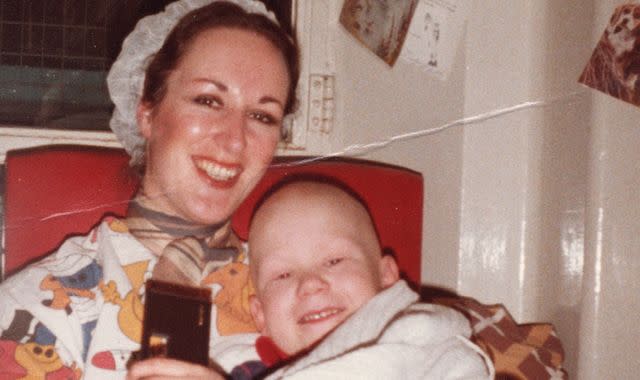Mother says she gave terminally ill son morphine which 'did end' his life - as police 'make enquiries'

Police say they are "making enquiries" after a mother admitted giving her terminally ill young son a dose of morphine that "did quietly end his life".
Hamish Cooper, who had a rare childhood cancer, was aged seven when he died at home in December 1981.
He was five when he was diagnosed with stage four neuroblastoma and had been "in a lot of pain" by the end of his life, according to his mother Antonya Cooper, who is now living with her own incurable cancer.
She told BBC Radio Oxford: "I gave him a large dose of morphine that did quietly end his life."
Ms Cooper, who lives in Abingdon, Oxfordshire, was asked on the programme if she understood she was potentially admitting to manslaughter or murder and she replied: "Yes."
The mother said: "If they come 43 years after I have allowed Hamish to die peacefully, then I would have to face the consequences. But they would have to be quick, because I'm dying too."
Euthanasia - deliberately ending a person's life to relieve suffering - is illegal in England and could be prosecuted as murder or manslaughter.
As with all criminal offences, the Crown Prosecution Service (CPS) must follow the principles set out in the Code for Crown Prosecutors when deciding whether to start or continue a prosecution.
Speaking about her final moments with her son, Ms Cooper, who has joined assisted dying clinic Dignitas, told PA Real Life in May: "In the middle of the night, we were by his bedside.
"He was expressing that he had pain and I said, 'Would you like me to take the pain away?'
"He said, 'Yes please, Mama', and so I gave him a dose of morphine sulphate through his Hickman catheter."
"We had watched him brave through all that beastly treatment, we had had him for longer than the original prognosis, so the time was right," added Ms Cooper, a former chair of Neuroblastoma UK.
Thames Valley Police said it was "aware of reports relating to an apparent case of assisted dying of a seven-year-old boy in 1981".
The force added: "At this early stage, the force is making enquiries into these reports and is not in a position to comment further while these investigations continue."
Read more from Sky News:
Tributes to terminally ill British woman
MPs share experiences during assisted dying debate
Bake Off star says her brother was 'begging to die'
There have been louder calls for a change in the law around assisted dying in recent months, with legislation being considered in Scotland, the Isle of Man and Jersey.
Broadcaster Dame Esther Rantzen has called for a free vote in the UK parliament on assisted dying. She has stage four lung cancer and revealed in December she had joined Dignitas in Switzerland.
Campaigners opposed to a change in the law have expressed concerns that legalising assisted dying could put pressure on vulnerable people to end their lives for fear of being a burden on others.
They claim the disabled, elderly, sick or depressed could be especially at risk.

 Yahoo News
Yahoo News 
